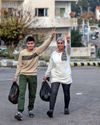
"I was in my early 20s. I had just become a mum and didn't understand it," she says.
"I had all these questions. What is a woman? Is this it? I didn't know what I was supposed to be doing." With poetry, she adds, "you can say a lot of things and it's so therapeutic".
Just writing poems was not enough, however; Chisakula wanted to share her stories. She was inspired to write spoken-word poetry - a genre written to be read out loud and performed when she heard I Will Wait for You by Janette...ikz, an American spoken-word poet.
Now, she is spearheading efforts to expand the spoken-word scene in her homeland, Zambia. In 2017, she cofounded Word Smash Poetry, a movement for young creative activists across southern Africa.
In her own award-winning work, she uses poetry as a tool for activism, focusing on issues including women's rights, African identity and mental health.
"I believe in the beautiful persuasion that art brings to the table," she says. "Art is a form of protest that leaves no blood. It can be peacefully done but a strong message can be communicated artistically."
Diese Geschichte stammt aus der January 19, 2024-Ausgabe von The Guardian Weekly.
Starten Sie Ihre 7-tägige kostenlose Testversion von Magzter GOLD, um auf Tausende kuratierte Premium-Storys sowie über 8.000 Zeitschriften und Zeitungen zuzugreifen.
Bereits Abonnent ? Anmelden
Diese Geschichte stammt aus der January 19, 2024-Ausgabe von The Guardian Weekly.
Starten Sie Ihre 7-tägige kostenlose Testversion von Magzter GOLD, um auf Tausende kuratierte Premium-Storys sowie über 8.000 Zeitschriften und Zeitungen zuzugreifen.
Bereits Abonnent? Anmelden

'It's really a disaster' The fight to save lives as gang war consumes capital
Dr James Gana stepped out on to the balcony of his hospital overlooking a city under siege. \"There's a sensation of 'What's next?'. Desperation is definitely present,\" the Médecins Sans Frontières (MSF) medic said, as he stared down at one of scores of camps for displaced Haitians in their country's violence-plagued capital.

Trailblazers The inspiring people we met around the world this year
From an exuberant mountaineer to a woman defiantly facing the guns of war, here are some of the brave individuals who gave us hope in a tumultuous 2024

Votes of confidence
From India to Venezuela and Senegal to the US, more people voted this year than ever before, with over 80 elections across the world. With rising authoritarianism and citizen-led resistance revealing its vulnerabilities and resilience in the face of unprecedented challenges, has democracy reached its breaking or turning point?

Out of touch How president sealed his own fate in martial law gambit
For Yoon Suk Yeol, this month's short-lived martial law declaration wasn't just a catastrophic miscalculation - it was the culmination of a presidency that had been troubled from the start.

Son of the soil Who is François Bayrou, the farmer turned prime minister?
François Bayrou, the new French prime minister, calls himself a country man. A tractor-driving \"son of the soil\" and breeder of thoroughbreds, he has run for president three times, saying his rural roots and centrist politics led him to try to find common ground between left and right.

Power plant workers keeping the lights on
The Guardian Weekly visits a Soviet-era coal-fired thermal installation to learn how it has held up to Russian attacks

Prince charmed Alleged spy scandal may have exposed China threat
Prince Andrew should be commended for doing Britain a great service, according to longstanding China watcher Charles Parton. The now marginalised royal has, the analyst observed, \"almost single handedly\" succeeded \"in highlighting the threat to free and open countries\" posed by the contemporary Chinese state.

In Moscow, a new life of secluded irrelevance awaits Assad
He was whisked away without a last message to his people, the aircraft's transponder deliberately switched off to avoid detection as it departed from an airbase in Syria.

'We fear new oppression' Alawites worry over rebel rule
To prepare khubeiza, the leaves of the kale-like plant must be roughly chopped and sauteed with onions, garlic and a dash of salt. According to folklore, the recipe originated among the Alawite communities who lived in Syria's mountainous coastline where the fibrous, wild-growing plant can be found in abundance. So poor were the Alawites in Ottoman times, the story goes, that the only food they could find to eat was khubeiza, which sprouts like a stubborn weed every spring.

'Gisèle is waiting for explanations'
The Pelicot rape trial has horrified the world. But as it comes to an end, the questions it has raised about French society and rape culture have still not been answered.